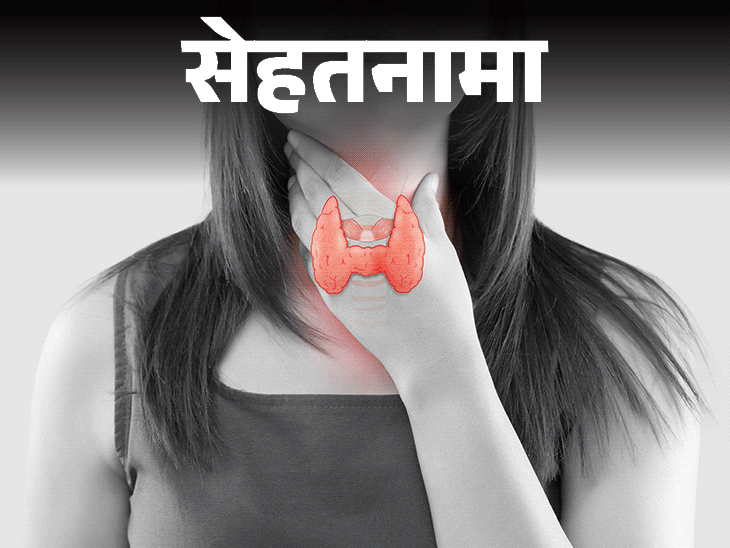13 minutes agoAuthor: Shivakant Shukla
- copy link

hypothyroidism Have a metabolic disorder. In this, the production of hormones in the thyroid gland decreases, due to which many health problems can occur.
People suffering from hypothyroidism usually gain weight rapidly. Despite healthy diet and daily exercise, it is very difficult for them to lose weight. However, with some vigilance and caution, weight can be reduced.
According to a report published in the National Library of Medicine, about 4.2 crore people in India are suffering from thyroid.
According to a report published in the medical journal ‘Lancet’, 11% people in India are victims of hypothyroidism. Whereas in the UK this number is only 2% and in the US it is 4·6%. The probable reason for this is the long-standing iodine deficiency in the country. People living in land areas are more at risk than people living near the sea.
so today medical certificate In this we will talk about hypothyroidism and weight loss. You will also learn that-
- What is the connection between hypothyroidism and weight gain?
- What to eat and what not to eat in hypothyroidism?

Question- What is hypothyroidism?
answer- There are two types of thyroid problems, one is hypothyroidism and the other is hyperthyroidism. In hypothyroidism, less hormone is produced in the thyroid gland and in hyperthyroidism, more hormone is produced. If it is not treated at the right time, the problems increase.
The thyroid is a butterfly-shaped gland located in the front of the neck, below the voice box. This gland is responsible for producing hormones, regulating metabolism and the proper functioning of all organs.
Question- What is the relation between hypothyroidism and weight gain?
answer- The essential hormones produced in the thyroid gland control the body’s metabolism. When there is a deficiency, metabolism slows down. Due to this, more calories get accumulated in the body and weight increases.
Hypothyroidism causes fatigue and weakness, which leads to reduction in physical activity, which is a reason for weight gain. Apart from this, hypothyroidism increases appetite, due to which the person eats more. Due to this also weight can increase.
Question- How to know that someone is suffering from hypothyroidism?
answer- Generally, there are hardly any symptoms of hypothyroidism in the initial stages. However, some of its most common symptoms include weight gain, muscle pain, chills, weakness, stress or anxiety, and swelling on the face.
If any of these symptoms are seen, it is important to consult a doctor. Doctors conduct blood tests to detect hypothyroidism.
Question: Can weight be reduced in hypothyroidism?
answer- Dr. Saket Kant explains that metabolism slows down in hypothyroidism, which can make weight loss difficult. But weight loss is possible with proper care and lifestyle changes. For this, a person suffering from hypothyroidism should take some important steps. Understand it with the pointers below-
- The first and most important step is to get proper treatment for hypothyroidism. This can normalize metabolism again and help in weight loss.
- Eat a diet rich in protein, fiber and good fats like Omega-3. These make you feel full for a long time and also keep your metabolism better.
- Do physical exercise for at least 45 minutes daily. This burns calories, which is helpful in reducing weight.
- Due to hypothyroidism, you may feel tired quickly. Therefore it is very important to get enough sleep.
Keep in mind that a person suffering from hypothyroidism should not try to lose weight too fast. This can be harmful to health. Therefore, weight loss should be done slowly and steadily. To lose weight in hypothyroidism, along with adopting a healthy lifestyle, it is also important to take a balanced diet. Understand this from the graphic below-

Question- What to include in the diet for weight loss in hypothyroidism?
answer- For this, include items containing iodine in your diet. Like iodized salt, plums, bananas and dairy products. Deficiency of Vitamin D in hypothyroidism also leads to weight gain. Therefore, include foods rich in Vitamin D in your diet. Apart from this, what else can you eat, see the pointers below-
- Eggs, pulses, meat, fish and curd.
- Fruits, vegetables, whole grains, oats, brown rice and beans.
- Flaxseed, almonds and walnuts.
Question- What should not be eaten in hypothyroidism?
answer- To reduce weight gain due to hypothyroidism, it is not enough to know what to eat and what not to eat. It is also important to know when and how much to eat. For this, eat small amounts at several times. Avoid eating right before sleeping and never overeat.
Apart from this, people suffering from hypothyroidism need to be very careful in eating and drinking. What things should not be eaten in hypothyroidism, understand it from the graphic below-

Question- After how many days should the thyroid test be done?
answer- Thyroid testing depends on the person’s condition and doctor’s advice. Doctors usually recommend testing every 3 to 6 months so that thyroid hormone status can be monitored and necessary changes in medications can be made.
,
Also read this news of Sehatnama
Sehatnama- 188 crore people are not getting enough iodine: 20 crore people in India are at risk of IDD, how to overcome iodine deficiency

According to the World Health Organization (WHO), about 188 crore people in the world are not getting enough iodine in their diet. These also include 24.1 crore school children. All of these people are at risk of iodine deficiency disorder (IDD). Read the full news…



